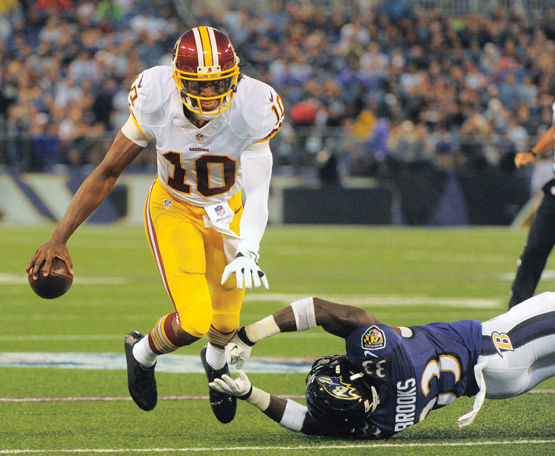Pressure builds in Washington over football team name

August 26, 2014
Our nation’s capital is accustomed to dealing with pressure from protests like the Civil Rights March in 1963 or Occupy Wall Street in 2011, but now the Washington area may see demonstrations every Sunday outside of FedEx Field.
The 2013 NFL season brought a renewed effort to eliminate the name of Washington’s football team, now understood as a racial epithet targeted at Native Americans. Protests occurred outside of Washington’s away games last season in Dallas, Denver and Minneapolis — cities with relatively high Native American populations.
In Nov. 2013, FedEx Field — Washington’s home stadium — saw a protest attended by representatives of other ethnic minorities led by Hakim Muhammad, a leader of the Coalition of Prince George’s County Leaders and Organizations. But the elimination process faded during the final weeks of the season as Washington’s playoff hopes came to an early end.
Although Washington made some important roster moves during the offseason, the media paid closer attention to the move it chose not to make.
In an interview with ESPN’s “Outside the Lines,” owner of the Washington team Dan Snyder said the Washington “fan base represents honor, represents respect, represents pride.”
Snyder has been under heavy fire for his stubbornness in defending his team’s name. The label he equates with pride is the same as the one white settlers in western colonies used to describe the skin tone of natives, as well as a word to count the number of Native American scalps collected by trappers. The term developed into a derogatory distinction between the former Europeans and Native Americans.
It is no longer a question of whether or not the word is a racial slur. The NFL is waiting for Snyder to make a move on its troubled name and, according to a Vox Populi poll, nearly one-third of football fans in the DC Metro area find the team name offensive.
Two years ago, I discussed Washington’s team name for an article and concluded that if Washington finally authorized a name change, it would receive overwhelming protests from large sports media corporations like ESPN and Sports Illustrated.
When I first brought up the issue, Derek Donovan, the public editor for the Kansas City Star, said he found the team name “unhealthy” and banned its use from the newspaper following a 2012 matchup between Washington and the Kansas City Chiefs.
Other newspapers, like the Seattle Times and San Francisco Chronicle, shortly followed suit, and on Monday, the Washington Post said it will not use the team’s name in its editorials. Multiple online news outlets, like Slate and The New Republic, also jumped on the anti-Washington name wagon this summer — they just say “Washington,” as in “Washington scored a touchdown.”
But the pressure really intensified when two top NFL analysts, Phil Simms of CBS and Tony Dungy of NBC, announced this summer that they will no longer use the racial epithet while broadcasting. Simms was a Super Bowl-winning quarterback with the New York Giants in 1986, and Dungy coached the 2006 Indianapolis Colts to a title.
Another large identity in the football world further damaged Washington’s reputation when former NFL referee Mike Carey, who now works for CBS, announced that he had not worked a Washington game between 2006 until his retirement in 2013 because he disagreed with the use of the team name.
The publicity of the controversy carried the debate into the political realm, where even more pressure began to fall on Snyder and his team.
On May 1, Senate Majority Leader Harry Reid called on NFL Commissioner Roger Goodell and Snyder to change the team name after results came out from the Donald Sterling fiasco and said, “It’s time for NFL commissioner Roger Goodell to follow NBA counterpart Adam Silver’s lead and rid his league of bigotry and racism.”
Next, the U.S. Patent and Trademark Office canceled Washington’s trademark in June. Although Washington’s lawyers are confident that the ruling will be overturned, the cancellation symbolizes a protest in the political community.
Former Secretary of State Hillary Clinton and current Attorney General Eric Holder have joined several other politicians in calling on Snyder to change the team’s name. President Barack Obama also said he would “think about changing” the team’s name if he owned Washington’s football team.
With the support of voices in the Capitol Building, the final push to pressure Snyder into making a move will come from ESPN and Sports Illustrated.
Although ESPN reporters have not publicly announced their refusal to work with the term, the network released a statement last weekend that said they recognize the debate over the term and “have afforded individuals the opportunity to decide how they will use those words when reporting on the team.”
Sports Illustrated has made similar strides. The prominent sports writer Peter King stopped using Washington’s name in the middle of the 2013 season, but Sports Illustrated needs a couple more national writers to join voices with King to make a significant impact.
Snyder has not given up, launching several Pro-Washington Football campaigns through sports media outlets, but the pressure has reached a point where it is not going to let up.
Even Maryland Governor Martin O’Malley, who is a likely presidential candidate in 2016, said a few weeks ago that it is “probably time” for Washington to find a new name. FedEx Field is located in Landover, Maryland.
“We hope that in every generation we become more understanding of one another [and] more respectful of the dignity of every individual [and] culture,” O’Malley said on Aug. 5 from his personal Twitter.
Our generation has realized that Washington’s team name was a mistake. With a little more pressure, it should be changed by the end of the 2014 NFL season.


